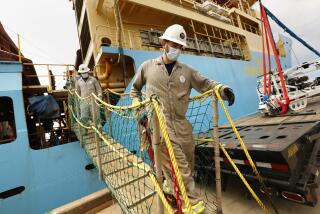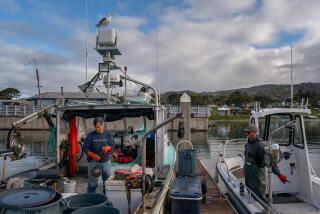In too deep with overfishing
Re âFisheries Set to Collapse, Study Warns,â Nov. 3
This article reinforced what weâve been hearing from many oceans experts for years. Unfortunately, reliance on farming fish in the open ocean to meet rising consumer demand, as recommended by an industry association, could make the problem worse. Farming one pound of fish in the ocean requires at least three pounds of wild fish to be used as feed, further depleting marine fisheries.
Congress may consider opening U.S. oceans to a relatively untested form of industrial aquaculture this fall -- anchoring fish farms to decommissioned oil and gas rigs. Huge open ocean fish farms could release antibiotics, chemicals, hormones and fish feeds with known carcinogens into the marine environment, and escaped farmed fish could compete with and spread disease to wild populations.
WENONAH HAUTER
Washington
The writer is executive director of the Food & Water Watch organization.
*
The report in the journal Science would have us believe that all of the worldâs ocean fisheries are tilting over the abyss. This is not the case in the North Pacific. Fisheries managers and fishermen listen to local scientists and stay within catch limits. It is important to refrain from broad-brush approaches to ocean conservation. We must address each issue with specific and practical solutions.
The Alaska model is a guide to balancing commercial fishing interests with conservation interests. The North Pacific represents more than half of U.S. fisheries landings, and yet there is no overfishing in this region. In Alaska, we are guided by our scientists, and the seafood industry works to ensure that ecosystem considerations are being addressed and the habitat is protected.
DAVID BENTON
Juneau, Alaska
The writer is executive director of the Marine Conservation Alliance.
*
The Times provided a clear overview of the dismal state of our worldâs major fisheries. The good news is that our oceans can provide more fish than they currently do. The reproductive potential of many fish increases with age, so the longer they stay in the water, the more they reproduce. Yet present fishery management policies encourage fishermen to maximize todayâs catch at the expense of future stock status by allowing too many fish to be taken too fast. The solution? Policies that integrate marine protections and align fishermenâs economic interests with the health of the oceans.
DAVID FESTA
Washington
The writer is director of the Oceans program of Environmental Defense.
*
I hope theyâre making enough Soylent Green.
BRIAN BARD
Glendale
More to Read
Sign up for Essential California
The most important California stories and recommendations in your inbox every morning.
You may occasionally receive promotional content from the Los Angeles Times.










